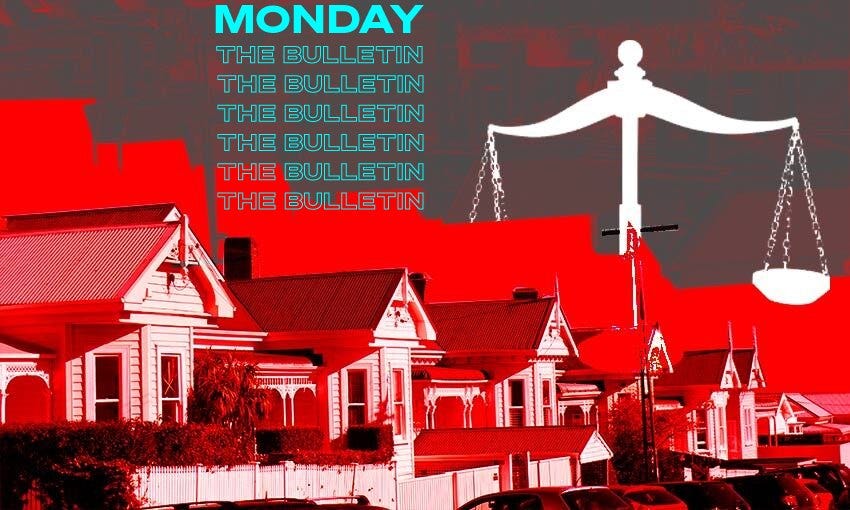Is government policy pushing up rents?
The Beehive is looking at ways to help struggling renters, but the opposition thinks some existing policies are doing more harm than good
Mōrena and welcome to The Bulletin for Monday, February 8, by Justin Giovannetti. Presented in partnership with Z Energy.
In today’s edition: Anti-mandate convoy heads to parliament; health ministry admits it seized rapid tests; Great Barrier Island locals contend with being a hot spot; but first, is rent control next for New Zealand?
New Zealand’s rental prices rose nearly 6% last year. (Design: Tina Tiller)
Rents are rising steadily and vacancies are down. The government is looking at what it can do next. Associate housing minister Poto Williams has mused about imposing rental control to help the country’s struggling tenants. She’ll be getting advice from housing officials this week. As Miriam Bell reports for Stuff, some investors are warning that government policies are already “ruining” the private rental market. One investor in Christchurch warned that the number of properties advertised on Trade Me is less than half of normal and the only time it was lower was right after the earthquakes. Country-wide data shows a drop across the regions in rental availability. Along with lower availability, rents rose nearly 6% last year.
It has certainly been a turbulent few years in the rental market. While some of the changes might have been overdue, owners now face stricter healthy home standards, an annual limit on the number of times they can increase rents, as well as new tax rules on rental losses, interest deductibility and a decade-long bright line test.
On rent control. It’ll likely come up this week as National and Act have warned that rent control would be a disaster for the country’s cities. Act likened its impact to an aerial bombing campaign. The international evidence is uncertain, but largely concludes that rent control helps tenants in the short-run but lowers new construction and maintenance over time. However, those examples are largely from the US in the last century and it’s hard to understand how they’d apply to 2022 New Zealand.
Regardless of whether rent control is on the final menu of options, there are growing calls for the government to act. According to RNZ, there are worries that high rents will fuel increasing disobedience and calls for social supports.
One government policy could face a rare bipartisan chopper: The accomodation supplement. It’s been said quietly over drinks in Wellington that the accomodation supplement could be the government’s worst policy. In theory, it’s excellent. The supplement is a payment to help lower-income families afford their housing costs. The problem, as both the Greens and National told One News, is that the money goes right into the pockets of landlords. It might also be driving up rents, but the evidence is mixed. The programme has doubled in size since 2016 and now costs the government about $32 million a week. That’s a massive government programme and while it helps tenants pay for this week’s rent, it does nothing to fix the problem and might actually make it worse. Both opposition parties would rather see the money used to build affordable homes for people on low incomes.
If we’re looking overseas for ideas, we could look to Singapore. The city-state has squeezed more residents than the population of New Zealand into an area about the size of urban Auckland. As Singapore’s population has increased, the share of people owning their own homes has increased. About 90% of people between the ages of 25 and 34 own their homes and Australia’s ABC explains how. In short: the government’s housing agency has built nearly 80% of the nation’s homes and has remained popular as it has done so.
Quality journalism shouldn’t be a privilege. This is why we are determined to keep our content freely available without a paywall. Help us continue to do so by joining The Spinoff Members today.
Is your organisation keen to support The Spinoff? We would love to hear from you – contact us today to find out more about our organisation memberships.
Large ‘freedom convoy’ headed to parliament. Hundreds of vehicles gathered on the North and South Islands over the weekend for a drive on parliament today, The Press reports. The convoy’s organisers say they are demanding an end to vaccine mandates. While they’ve stressed that they plan a peaceful protest, One News reports that some service stations closed after attendants faced aggression and intimidation from the convoy. It’s unclear how long the protest intends to stay in Wellington.
State of emergency in Canada. New Zealand’s convoy is modelled after one that has camped out in the centre of the Canadian capital for the last week. Ottawa’s mayor has declared a state of emergency as big rigs have blocked the city’s streets and kept residents awake for days with nonstop air horns. Politico reports that the Canadian protest has embolden far-right groups around the world, including white supremacists. While Canadians generally hold an unsympathetic view towards the unvaccinated, what local support the convoy may have had was quickly lost amid a flurry of swastikas, Confederate flags and images of protestors dancing on the Tomb of the Unknown Soldier.
The ministry of health backtracks on earlier claim it didn’t seize rapid tests already in New Zealand. Director-general of health Ashley Bloomfield said last month that Covid-19 rapid tests taken from private businesses were only overseas orders being “consolidated” in government warehouses on arrival. Tests in the country weren’t being taken for government use, he said at the time. The ministry has now told the NZ Herald’s Thomas Coughlan that they did take tests after arrival, including all the tests delivered by one of three large manufacturers. It’s unclear when those seized tests will be replaced and orders fulfilled for the businesses that ordered them.
At least 28 assisted deaths in the three months after it became legal. After two-thirds of New Zealanders approved the end of life referendum in 2020, Stuff reports on the first health data covering the three months after the option became available in November for terminally-ill New Zealanders. There are strict criteria about when the practice can be used. The ministry expects about 950 applications annually for assisted dying, with about one-third approved.
The new Waiheke is already changing, as holidaymakers and Instagrammers descend on Great Barrier Island. Chris Schulz reports for The Spinoff on the hot gossip and hot property on Great Barrier as locals cope with demand from being the hit holiday destination for Aucklanders. The great vistas and relative isolation, complete with spotty cell service, has attracted a growing crowd. Like many communities around the world, locals are now grumbling about the move towards overtourism and the queues that come with it.
You probably enjoyed a day off yesterday to mark Waitangi, or you may have been paid time-and-a-half. A surprisingly large numbers of New Zealanders had neither. Writing in The Spinoff, Charlotte Muru-Lanning explains the deep unfairness in New Zealand law that means many people don’t get paid public holidays. If you don’t usually work on Monday or Friday, you’re likely to miss a number of public holidays this year. That’s a big issue for retail workers. If you’re scheduled Tuesday to Saturday, you work five days when everyone else gets a paid day off for a Mondayised public holiday. Why? New Zealand’s labour law is decades old and assumes everyone works Monday to Friday.
Got some feedback about The Bulletin, or anything in the news?
Get in touch with me at thebulletin@thespinoff.co.nz
Right now on The Spinoff: Mirjam Guesgen details what we know about the new, faster-spreading omicron subvariant. Chris Schulz looks at the breakfast wars, between TVNZ’s juggernaut and the new team on a rebranded AM show. Clint Smith explains how Christopher Luxon can try to top Jacinda Ardern in question time. Justin Latif reports on a man’s 37-year battle to get a speed bump installed where he was nearly killed by a speeding car. Reweti Kohere finds that money can buy you happiness, at least for 11 minutes.
For a longer read today, preventing the next pandemic would be cheaper than the last two years. With much of the world still facing some form of Covid-19 restrictions, it would seem unnecessary for a study to point out that stopping pandemics is cheaper than responding to them. The outbreak has cost millions of lives and trillions of dollars. As Mongabay reports, there’s been a global understanding that we need to prepare to respond to the next outbreak better. But why not prevent it? Human activity, especially deforestation and unregulated trade in wildlife, has a significant impact on spreading zoonotic diseases and creating pandemics. Let’s stop that.
‘The best run of my life’. Zoi Sadowski-Synnott won New Zealand’s first winter Olympic gold medal on her snowboard with a flawless run on the slopestyle course. She spoke with The New York Times and gave them a moment-by-moment explanation of her run, along with the final trick that sealed New Zealand’s medal win. The story helps unpack with stunning visuals what all the snowboard jargon means.







I find that much of your coverage of overseas news simply repeats the often shallow and biased reporting of mainstream reporting from the US and UK in particular. So, sadly, it is not surprising that your report on the Canadian Trucker's anti-mandate protest ignores the central issues and peaceful nature of the protest in favour of noting the totally peripheral fact that one person (probably not a trucker) displayed an irrelevant US Confederate flag and somebody else got attention for their oh so significant display of a Nazi flag - as expected - while one has to turn to independent blogs and news sources to get an honest idea of what the trucker's action is actually about. Personally, I think the Spinoff has gone downhill in its journalism recntly, and that is a serious worry.
It’s very irritating to be provided with links you can’t access, for example to The New York Times which is behind a paywall. At least tell us before we waste time trying to read the story (of Zoi’s Olympic gold).